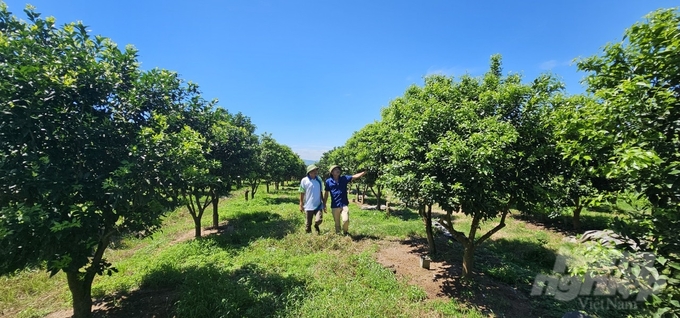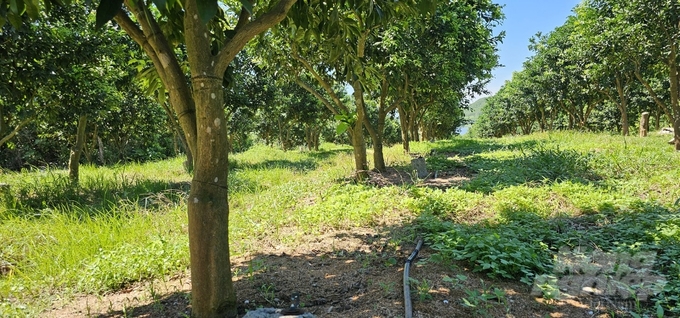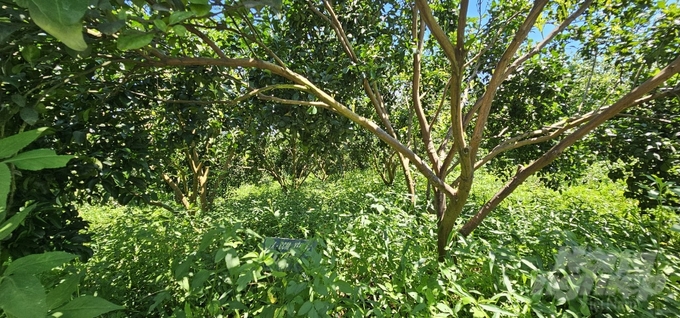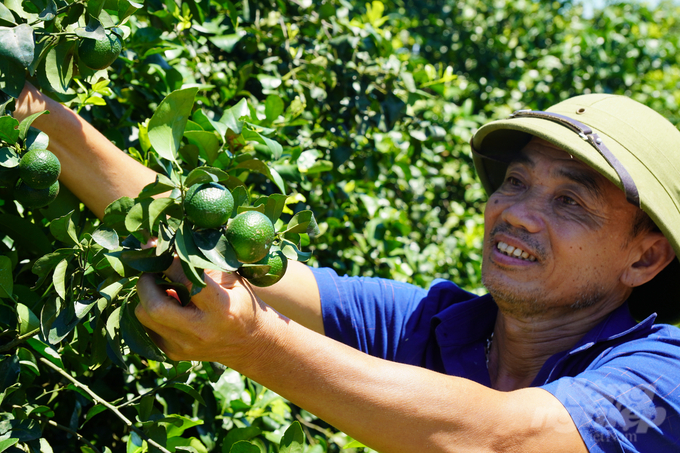June 18, 2025 | 15:57 GMT +7
June 18, 2025 | 15:57 GMT +7
Hotline: 0913.378.918
June 18, 2025 | 15:57 GMT +7
Hotline: 0913.378.918
Chemical abuse and unsustainable farming not only cause the soil in mountainous areas to be depleted of nutrients but also increase erosion, landslides, and the risk of flash floods during the rainy season. Sustainable agricultural solutions that minimize negative impacts on the environment become urgent requirements.
Dang Quang Du is originally from Hung Yen, but has been working in Thanh Hoa for nearly ten years. Realizing the potential of the soil and climate conditions here suitable for fruit trees, Du and three partners (including Nguyen Duc Minh, Trinh The Anh, Do Van Bich) contributed capital, rented land, and converted the acacia garden into a citrus orchard in Dong Trung village, Yen Lac commune (Nhu Thanh district, Thanh Hoa) with an area of over 40 ha.

Du's Canh orange hill is always lush and lively, promising a high yield at the end of this year. Photo: Quoc Toan.
In 2016, Du started planting thousands of Dien grapefruit, pink grapefruit, and Thai tangerine trees. However, just a few years later, he decided to switch from grapefruit to Canh orange and Thai tangerine because the grapefruit trees at that time did not bring the expected results. “Although Dien grapefruit and green-skin grapefruit have good drought resistance and are very strong, these varieties are grown en masse in many localities, causing the market to gradually become saturated,” he said.
A few years later, while thousands of Dien grapefruit and pink grapefruit trees were growing, Du and his colleagues decided to cut the trunks and branches, leaving only the base for grafting. The process of “crossbreeding” Canh oranges and Thai tangerines on Dien grapefruit trees took him a lot of time and effort.
He first experimented with grafting Thai tangerines and Canh oranges onto Dien grapefruit roots in a small area and then expanded the area when he saw the positive results. To achieve such feats, Du hired dozens of experts and technical workers from Hai Duong and Hung Yen, living and eating together in the garden.

The Canh orange and Thai tangerine gardens are grafted onto Dien grapefruit roots, so the trees grow very strongly, are resistant to pests and diseases, give very high yield and produce quality fruit. Photo: Quoc Toan.
The Thai tangerine garden of Du and his colleagues has now had its third harvest, yielding nearly 200 tons, bringing in an income of VND 4.5 - 5 billion per crop. His orchard is always packed with containers lined up waiting for their turn to collect the goods. As for the Canh orange tree, it will only produce its first crop of fruit at the end of this year. Taking into account the tree's life cycle of 30 to 40 years, the orchard of thousands of trees can bring in hundreds of billions of VND in revenue for the garden owner.
Du’s orchard is located on a gentle hill and is well planned from the walkway to the automatic irrigation system. Unlike many other orchards, his Canh orange and Thai tangerine orchard is overgrown with grass, reaching up to half the tree trunk. Between every two rows of fruit trees, there is a 5 - 6 m wide, 40 cm deep ditch. It stretches nearly 200 m from the top to the foot of the hill to drain water during heavy rains and prevent soil erosion.

Natural vegetation in the garden helps protect the roots, creates a favorable environment for beneficial microorganisms and nemesis of pests to develop, and effectively prevents soil erosion. Photo: Quoc Toan.
Du’s orchard utilizes organic farming methods. One thing to note is that at each tree and ditch, Du lets the vegetation grow naturally, with grass growing wildly to prevent the tree roots from burning in the sun and rotting in the rain. For nearly ten years, this steep hill has never been washed away, all thanks to the vegetation covering the garden.
“One of citrus trees’ signature traits is that they are ‘afraid’ of water. When it rains heavily and for a long time, the roots are likely to rot. Therefore, the grass growing around the base of the trees is considered an important biological buffer to help them grow. When it rains, the grass will cover the roots, absorb some of the water, prevent erosion and help the soil to be aerated. When the rainy season ends or when it is time to fertilize, we clear the grass and pile it around the base, creating a very good natural organic fertilizer after the grass decomposes,” said Nguyen Duc Minh, technical officer and shareholder at the fruit orchard.

Thai tangerines promise a bumper crop. Photo: Quoc Toan.
When it comes to citrus tree care, there are two important stages that determine the success or failure of the orchard: the "catching flowers and fruiting" process and the pre-harvest stage.
"One month before the tree blooms, you must stop providing nutrients and water to the tree so that it can easily flower and bear fruit. At the harvest stage, there is often a phenomenon of fruit drop and fruit rot caused by fungi and insects. To overcome this situation, we have placed many light bulbs in many locations around the orchard, and set a tank containing lubricating oil below so that when insects fall, their wings will be bound,” he said.
The fruit orchard of Du and his colleagues is now creating jobs and stable income for dozens of local workers, sometimes up to 40 people. Du and his colleagues also cooperate with agents and clean food supply chains inside and outside the province to consume hundreds of tons of Thai tangerines each year.
Translated by Samuel Pham
![Turning wind and rain into action: [9] Digitizing hydrometeorological data in response to climate change](https://t.ex-cdn.com/nongnghiepmoitruong.vn/608w/files/news/2025/06/17/z6704423696987_15fd32ffc26d590d204d520c9dac6786-nongnghiep-165943.jpg)
(VAN) Farmers have begun accessing hydrometeorological applications to adjust their cropping schedules, aiming to ensure productivity and adapt to climate change.
![Turning wind and rain into action: [8] Real-time salinity detection and early warning technology](https://t.ex-cdn.com/nongnghiepmoitruong.vn/608w/files/news/2025/06/17/z6704423696987_15fd32ffc26d590d204d520c9dac6786-nongnghiep-151127.jpg)
(VAN) Thanks to the integration of modern hydrological-hydraulic models, remote sensing technologies, and artificial intelligence, the accuracy of hydrological forecasting has significantly improved.
![Turning wind and rain into action: [7] Early disaster warnings help marine farmers minimize losses](https://t.ex-cdn.com/nongnghiepmoitruong.vn/608w/files/news/2025/06/17/z6704423696987_15fd32ffc26d590d204d520c9dac6786-nongnghiep-142942.jpg)
(VAN) In recent years, thanks to early disaster warnings and forecasting, marine farmers in Khanh Hoa province have been able to reduce risks and losses, thereby improving production efficiency.
![Turning wind and rain into action: [6] ‘Four on-the-spot’ disaster management software](https://t.ex-cdn.com/nongnghiepmoitruong.vn/608w/files/news/2025/06/17/e5a48259d6a262fc3bb3-nongnghiep-183800.jpg)
(VAN) By simply activating the scenario on the disaster management software, the relevant authorities immediately know how many households need to be evacuated, where to evacuate them to, and by what means of transportation…
![Turning wind and rain into action: [5] Hue applies modern technology in disaster forecasting](https://t.ex-cdn.com/nongnghiepmoitruong.vn/608w/files/news/2025/06/17/z6704423696987_15fd32ffc26d590d204d520c9dac6786-nongnghiep-093938.jpg)
(VAN) In Hue city, modern technology has recently been applied in meteorological and hydrological forecasting and warning, helping to reduce the damage caused by natural disasters.

(VAN) A cutting-edge farming technique being implemented on an experimental ranch in Arizona's Sonoran Desert has already saved a billion gallons of water over five years, according to Civil Eats.

(VAN) Poultry and pig production and the environment can be boosted through enhanced water technology, according to new research.